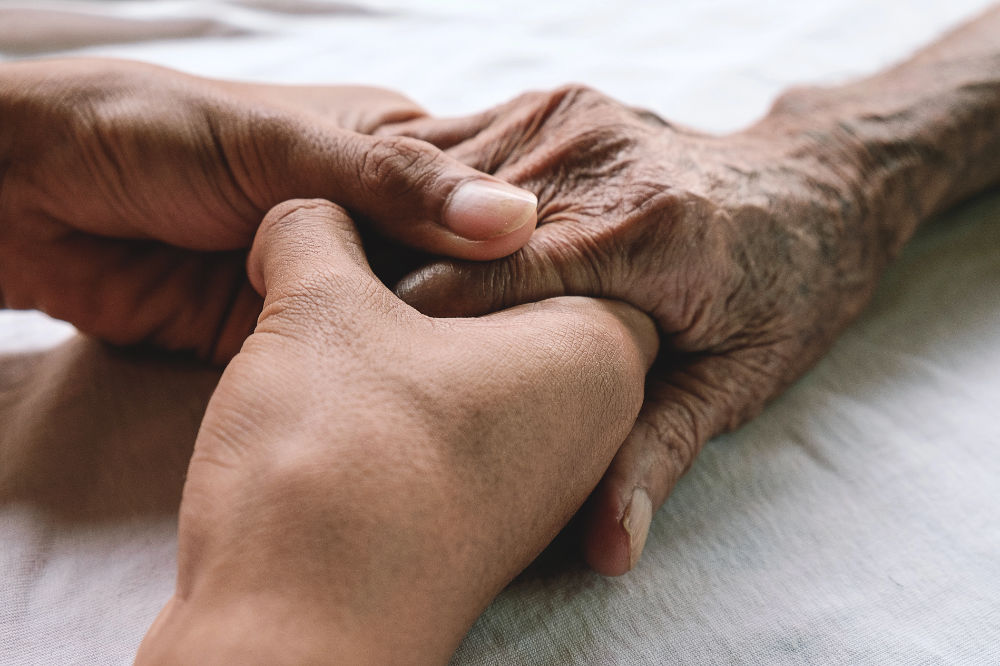

We all experience grief differently and respond to death and dying from the perspective of our own personal, spiritual or cultural beliefs.
For some, the topic is very difficult to contemplate, let alone discuss, while others are more comfortable talking about and navigating the challenges that arise during this natural part of life. It is an instinctive human behaviour to want to comfort and care for our loved ones but when the end of life draws near, we may not always feel equipped or adequately prepared to provide that care.
We may feel helpless about our lack of control over the person’s pain management and symptom control, or frustrated that they are no longer showing interest in food or drink.
Family members often provide food and drink as a natural act of nurturing and caring for someone. For some people at the end of life however, swallowing food, drink and medications can become very difficult and even distressing.
This is often due to a natural loss of appetite as the body gradually shuts down and can be additionally impacted by a physical swallowing difficulty known as dysphagia. If not managed appropriately, dysphagia can result in distressing incidences of choking or aspiration (when food or fluids enter the airways).
Dysphagia is surprisingly common in aged care settings and has a variety of causes such as degenerative illness, dementia, stroke and respiratory conditions.
So, how can we continue to care for and comfort our loved ones who are facing the end of life, in the instance that feeding them may no longer be a pleasant, comfortable or safe experience for them? Read on for some suggestions. Please note that not all suggestions will be suitable for every person or situation so always check with care staff beforehand. For people with swallowing difficulty, seek advice from a speech pathologist for strategies that are specific to the person’s abilities and goals of care.
Have you ever experienced an uncomfortably dry mouth or had that feeling where you desperately need to brush your teeth? Imagine if you were physically unable to initiate or perform your own mouth care. This is the reality for many people at the end of life and so receiving assistance with this task can be a refreshing comfort.
Level of alertness: Is the person awake? Can they sit upright? Can they follow instructions? If yes, assist them to brush their teeth or rinse their mouth out with water or a gentle mouthwash. You may need to remind the person to spit out rather than swallow during this process.
Is the person wearing dentures? Offer to clean these with a toothbrush and running water or a denture cleanser.
Is the person drowsy or unable to be sat upright? If in an aged care facility, ask the care staff to show you how to use mouth swabs and water to keep the person’s mouth moist. You can gently remove built up saliva or coatings on the lips, tongue and teeth with a soft toothbrush or damp mouth swab (squeeze excess moisture from the brush or swab first).
Dry mouth: In addition to its impact on swallowing, dry mouth can also affect sleep and the ability to speak. Dry mouth sprays or gels can be purchased at any pharmacy. If the person is very drowsy, be sure to check that the fluid you apply is not building up or pooling in the mouth as this can enter the airway and result in uncomfortable coughing, distress or additional health complications such as aspiration pneumonia.
Dry lips: Keep lips moist by gently cleansing and applying a plain, water-based lip balm.
Maintaining hydration for the purpose of comfort can be very tricky, especially if your loved one is unable to maintain alertness or has difficulty swallowing liquids.
Ice chips: If the person is awake, has a clean mouth and is able to sit upright, offer small pieces of ice to suck.
Use a teaspoon: The person may have difficulty positioning their mouth to drink from a cup or they may lack the lip strength to suck fluid through a straw. If the person can be sat at least semi-upright, slowly offer small amounts of fluids on a teaspoon. Stop if this causes discomfort for the person or results in excessive coughing, spluttering or difficulty breathing.
For further advice or person-specific recommendations about swallowing difficulty at the end of life, request a consultation by a speech pathologist. At Food Solutions, our speech pathologists share extensive experience in aged care-related swallowing and communication difficulties and are committed to evidence-based, person-centred care.
Doshi, M. et al., (2019) Mouth Care Matters, a guide for hospital healthcare professionals, 2nd Edition. Available at: mouthcarematters.hee.nhs.uk/wp-content/ uploads/sites/6/2020/01/MCM-GUIDE-2019-Final.pdf
Fleming, M., Craigs, C. & Bennett, M. (2020). Palliative care assessment of dry mouth: what matters most to patients with advanced disease? Supportive Care in Cancer, 28, 1121-1129
Haslam, S. (2020). Why Mouth Care Matters in End-Of-Life Care. British Dental Journal, 7, 10-11. Available at:
https://www.nature.com/articles/s41407-020-0255-7.pdf
Khadka, S., Khan, S., King, A., Goldberg, L.R., Crocombe, L. & Bettiol, S. (2021). Poor oral hygiene, oral microorganisms and aspiration pneumonia risk in older people in residential aged care: a systematic review, Age and Ageing, 50, 81-87
Marie Curie. (2021). Mouth Care in Palliative Care. Available at: https://www.mariecurie.org.uk/professionals/palliative-care-knowledge-zone/symptom-control/mouth-care
Marie Curie. (2017). What is end of life care? Available at: https://www.mariecurie.org.uk/help/terminal-illness/diagnosed/palliative-care-end-of-life-care
Soileau, K & Elster, N. (2018). The Hospice Patient’s Right to Oral Care: Making Time for the Mouth. Journal of Palliative Care, 33(2), 65-69.
Tan, L., Lim, Y., Ho, P., Lim, L., Lim, Y. & Low, J. (2021). Understanding Quality of Life for Palliative Patients With Dysphagia Using the Swallowing Quality of Life (SWAL-QOL) Questionnaire, American Journal of Hospice & Palliative Medicine, 38 (10), 1172-1176